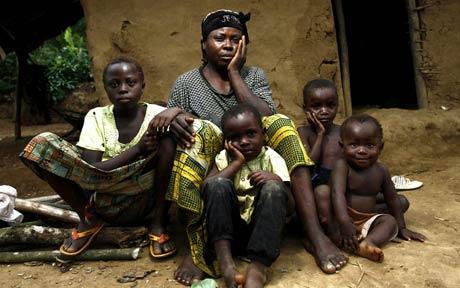By: Thalif Deen
As sexual abuse and paternity claims continue to rise against UN peacekeepers overseas, the United Nations is actively collaborating with troop contributing countries (TCC) in collecting DNA samples: a protocol introduced back in 2014.
The number of paternity claims – or potential paternity claims – has increased significantly: from 12 each in 2013 and 2014, to 15 in 2015, 33 in 2016 and 56 in 2017.
These are victims of “sexual exploitation and abuse,” according to the United Nations.
UN Spokesman Stephane Dujarric told reporters last week that with over 95,000 civilians and 90,000 uniformed personnel working for the United Nations around the world, sexual exploitation and abuse (SEA) are not reflective of the conduct of the majority of the dedicated women and men who serve people around the world.
“But every allegation involving our personnel undermines our values and principles and the sacrifice of those who serve with pride and professionalism in some of the most dangerous places in the world.’
For this reason, combating this scourge, and helping and empowering those who have been scarred by these egregious acts, continue to be key priorities for the Secretary General in 2018, Dujarric declared.
A spokesman for UN Peacekeeping told IPS: “Our UN Missions in the field have been assisting concerned Member States under whose jurisdiction matters of paternity and child support fall in obtaining DNA samples from mothers and children for the purpose of testing their DNA against DNA samples from alleged fathers to confirm or refute paternity”.
She said it is the responsibility of the Member State to collect the sample from the alleged father and test it against the DNA of the claimant and her child/children.
UN Secretary-General Antonio Guterres, who has declared “zero tolerance” on sexual abuse both by UN peacekeepers and UN staffers system-wide, has not only spelled out Special Measures to prevent such abuses but also called upon Member States to appoint “national paternity focal points” to receive and advise on paternity claims.
The paternity focal points are an important part of the process, as they can bridge the gap between the facilitation that can be offered by the United Nations, including DNA collection, and steps required under national laws to advance paternity claims.
“Several Member States have indeed appointed such focal points, and the United Nations has facilitated contacts between the focal points and the complainants,” the peacekeeping spokesman said.
“It is important to note that it is the responsibility of the Member States to collect and test the DNA samples from their personnel, in accordance with their national legislation on such collection and testing of DNA material for use in as evidence in legal proceedings. The Secretary-General however continues to liaise with Member States to ensure that any paternity and child support claim is addressed under the applicable national legislation,” she noted.
Deoxyribonucleic acid (DNA), which stores biological information, is described as a molecule that carries the genetic instructions used in the growth, development, functioning and reproduction of all known living organisms and many viruses.
According to a BBC report, Britain pioneered the use of DNA as a crime-fighting tool, introducing the world’s first national database in 1985. Currently, it holds the profiles of more than five million people and is credited with helping solve some 40,000 crimes a year.
Ma. Victoria (Mavic) Cabrera Balleza, Chief Executive Officer/International Coordinator, Global Network of Women Peacebuilders, told IPS that “DNA testing is long overdue”.
“This has actually been proposed by certain UN field officials many years ago. It should be mandatory to all personnel – civilian and uniformed – prior to deployment,” she said.
To say that submitting to DNA testing is equivalent to a presumption that all UN staff members are potential sex abusers is a misplaced concern, said Cabrera Balleza.
“Instead, it should be seen as an expression of honesty and sincerity to serve. However, DNA testing must not be the single measure to prevent sexual exploitation and abuse.”
She said discussions with Troop Contributing Countries should be ongoing to convince them to be more cooperative in prosecuting perpetrators. Civil society can play a key role in advocating for greater accountability from TCCs.
She also pointed out that training on the prevention of SEA should not only be prior to deployment. It should be prior, during and after. Changing attitudes and behavior is not possible with just one training.
The use of the single and uniform ‘Incident Report Form’ — to improve data collection, ensure investigation is carried out in a timely fashion, and adequate assistance to victims is provided immediately — is very much welcomed, she added.
“It is time for the UN and Member States to step up; bring out all the instruments and make funding available to end the scourge that is SEA . The response should go beyond condemnation. Victims need real solutions,” Cabrera Balleza declared.
Providing an update on SEA in the UN system- in line with the Secretary-General’s initiative on increasing transparency on ongoing allegations- Dujarric told reporters February 22 that from 1 October to 31 December 2017, “we have received 40 allegations for all UN entities and implementing partners. Not all allegations have been fully verified, and many are in the preliminary assessment phase.”
Out of the 40 allegations, 15 are reported from peacekeeping operations. These 15 are not new allegations — they have all been uploaded on the Conduct and Discipline database as they have come in. And that is a publicly available website.
The remaining 25 allegations are reported from agencies, funds and programmes, and include 8 allegations relating to implementing partners.
Of the 40 allegations, 13 are categorized as sexual abuse, 24 as sexual exploitation, and 3 are of an unknown nature. The 40 allegations involve 54 victims — 30 are women, 16 are girls (under the age of 18), the ages of 8 others are unknown; 12 of the 40 allegations occurred in 2017, 7 in 2016, 3 in [2015] or prior, and the dates are unknown for 18 of them, Dujarric said.
With regard to the status of the 40 allegations, two have been substantiated by an investigation; three are not substantiated; 15 are at various stages of investigation; 18 are under preliminary assessment; two are under review with limited information provided to the investigating entity, he added.
Sanam Naraghi-Anderlini, co-founder and Executive Director of the International Civil Society Action Network (ICAN), told IPS the idea of taking DNA samples from peacekeepers prior to deployment was first noted in a 2005 UN report.
Privacy advocates have pushed back against this issue since then, and they have a point.
“How do we know that our DNA samples, once given to the UN, will not be used, abused or hacked by others?”, she asked.
Nonetheless, the problem of SEA in crisis and conflict affected settings is very real- not just committed by peacekeepers but also civilians as evident from recent UN reports and allegations from international humanitarian organizations, said Naraghi-Anderlini, the first Senior Expert on Gender and Inclusion on the UN’s Mediation Standby Team.
She listed the ways to address this issue:
First, the UN could train and inform its civilian and security personnel about SEA issues, and make the DNA sample optional. People who have no intention of being sexually abusive or exploitative would likely lead the way by providing the swabs, and this could encourage others to participate too.
Second, during recruitment, training and preparation of civilian and security personnel, prior to deployment and during field missions, the message could be conveyed regularly and clearly: if they are implicated in SEA cases, suspension without pay is effective immediately. If investigations prove the allegations to be true, individuals will be terminated, and the UN would recommend criminal proceedings in cases of sexual abuse and rape and those involving exploitation of minors.
Third, if an individual is aware of SEA occurring but does not report it, he/she is also complicit and would face punitive action.
Fourth, TCC countries and countries with citizens staffing international missions (or seconded from the government) have to commit to taking swift action to demonstrate their seriousness of intent.




